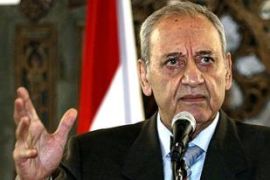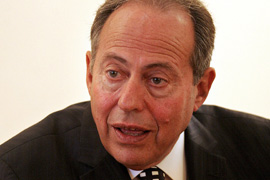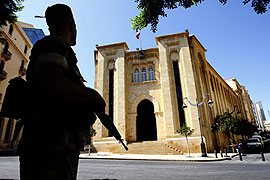Lebanon parliament set to convene
Opposition boycott expected to foil vote to pick incumbent president’s replacement.

Published On 25 Sep 2007
A two-thirds majority is required for a candidate to be elected by parliament in the first round of voting.
In the event of a second round, a simple majority suffices.
The opposition wants a deal on a consensus candidate to secure the attendance of its MPs.
Legislators of the March 14 coalition, who hold a slim majority, are attending the parliament session anyway.
Al Jazeera’s Zeina Khodr, speaking from outside the parliament building in Beirut on Tuesday, said ruling coalition deputies were arriving, but none from the opposition.
She said the security arrangements were unprecedented.
Factions summoned
The man who called for parliament to be convened is Nabih Berri, a prominent figure from the opposition Amal, another mainly Shia party, in his capacity as the speaker.
He acknowledged that a vote would not take place on Tuesday, but voiced optimism that a compromise would be reached by the deadline when Lahoud’s term ends.
“By November 24, there will be a president of the republic who will have the approval of all the Lebanese,” Berri said on Monday.
 |
| Lahoud, the current president, is viewed by the governing camp as a pro-Syrian figure [AFP] |
Khodr reported that Berri is expected to meet the ruling party deputies, including Saad Hariri of the Future bloc.
Legislators have between September 24 and November 24 to choose a candidate to replace Lahoud, whose six-year term was extended by three years in 2004 through a Syrian-influenced constitutional amendment.
Michel Suleiman, the army chief, and Riad Salameh, the central bank governor, are seen as possible compromise choices.
Marwan Hamadeh, MP and minister, said legislators from the March 14 coalition, who number 68 of the current 127-member house, intend to show up in force on Tuesday to mark their determination to end the crisis.
From the opposite camp, Mohammed Fneish, a senior Hezbollah official, said at the weekend that the party’s 14 MPs would not attend the parliamentary session if no agreement was reached beforehand on a consensus candidate.
Shadow of violence
Tuesday’s session, the first in nearly a year because of a long-running political crisis, comes less than a week after Antoine Ghanem, a Christian MP from the Phalange party, was killed in a car bombing last Wednesday.
 |
| Parliament has been placed under tight security for Tuesday’s session [AFP] |
The March 14 camp, of which Phalange is a part, blamed the bombing on Damascus.
Ghanem was the eighth anti-Syrian politician to be assassinated since the 2005 murder of Rafiq al-Hariri, five-time prime minister, that led to protests and forced Syria to end 29 years of military domination in Lebanon.
The overnment asked the army on Tuesday to take “all security measures … to guarantee the safety of MPs”, who have been living in hiding, many of them in a highly secure luxury hotel near the parliament.
Several legislators and politicians said the session would focus on consultative talks between the feuding factions rather than trying to reach the quorum necessary to elect a president.
Source: News Agencies